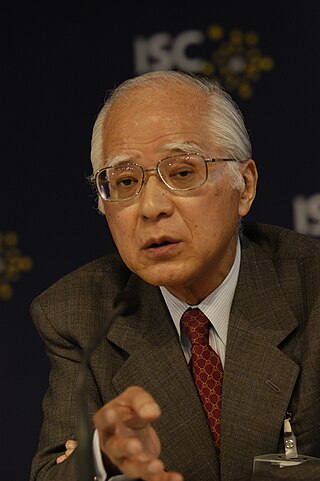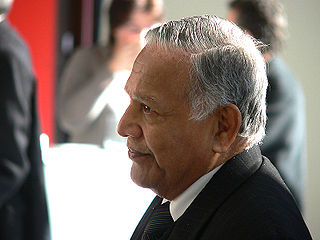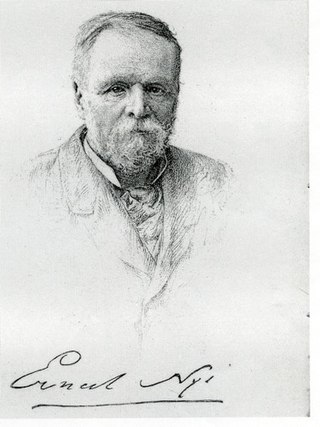Related Research Articles

From 13–18 May 1948 Jewish forces from the Haganah and Irgun executed Operation Pitchfork. Its aim was to capture the Jewish suburbs of Jerusalem, particularly Talbiya in central Jerusalem.

Hisashi Owada is a Japanese former jurist, diplomat and law professor. He served as a judge on the International Court of Justice from 6 February 2003 until 7 June 2018, and was president of the court from 2009 to 2012. He is the father of Empress Masako and the father-in-law of the incumbent Emperor of Japan, Naruhito.

Hans Kelsen was an Austrian jurist, legal philosopher and political philosopher. He was the principal architect of the 1920 Austrian Constitution, which with amendments is still in operation. Due to the rise of totalitarianism in Austria, Kelsen left for Germany in 1930 but was forced out of his university post after the Nazi seizure of power in 1933 because of his Jewish ancestry. That year he left for Geneva and in 1940 he moved to the United States. In 1934, Roscoe Pound lauded Kelsen as "undoubtedly the leading jurist of the time". While in Vienna, Kelsen met Sigmund Freud and his circle, and wrote on social psychology and sociology.

Rosalyn C. Higgins, Baroness Higgins, is a British former president of the International Court of Justice (ICJ). She was the first female judge elected to the ICJ, and was elected to a three-year term as its president in 2006.

Sir Hersch Lauterpacht was a British international lawyer, human rights activist, and judge at the International Court of Justice.
Brigadier General Kenneth "Ken" Watkin, is a Canadian lawyer, soldier and jurist. Watkin was Judge Advocate General (JAG) of the Canadian Forces from 2006 to 2010. He is an expert on military law.

Sri Lankabhimanya Christopher Gregory Weeramantry, AM was a Sri Lankan lawyer who was a Judge of the International Court of Justice (ICJ) from 1991 to 2000, serving as its vice-president from 1997 to 2000. Weeramantry was a judge of the Supreme Court of Sri Lanka from 1967 to 1972. He also served as an emeritus professor at Monash University and as the president of the International Association of Lawyers against Nuclear Arms.
Oscar Schachter was an American international law and diplomacy professor, and United Nations aide.

The American Society of International Law (ASIL) is a professional association of international lawyers in the United States. The organization was founded in 1906. After the Lake Mohonk Conference on International Arbitration, some participants felt the need for a society devoted to international law separate from international arbitration. Participants in a meeting held on December 9, 1905, at the residence of Oscar S. Straus agreed to establish the ASIL.

Jean-Pierre Lévy is a French lawyer, author and diplomat. He was the director of the United Nations Division for Ocean Affairs and the Law of the Sea in 1985.

Shabtai Rosenne was a Professor of International Law and an Israeli diplomat. Rosenne was awarded the 1960 Israel Prize for Jurisprudence, the 1999 Manley O. Hudson Medal for International Law and Jurisprudence, the 2004 Hague Prize for International Law and the 2007 Distinguished Onassis Scholar Award. He was the leading scholar of the World Court - the PCIJ and ICJ and had a widely recognized expertise in treaty law, state responsibility, self-defence, UNCLOS and other issues of international law.
Andrew Drzemczewski is the former head of the Legal Affairs and Human Rights Department of the Parliamentary Assembly of the Council of Europe, Strasbourg, France.; visiting professor, School of Law, Middlesex University London since 2016.

Ernest Nys was a Belgian lawyer and a professor of Public International Law at the University of Brussels. He also served as a member of the Permanent Court of Arbitration.

Max Sørensen was a Danish diplomat, judge, and professor of international law. He holds the distinction of being the first person to have sat as a judge on both the European Court of Justice and the European Court of Human Rights.
The Chorzów Factory case was a case heard before the Permanent Court of International Justice in 1927. It was an early authority in international law that established a number of precedents in International Law.
Edith Brown Weiss is an American lawyer and legal scholar, known for her contributions on International Law; specifically International Environmental Law. From 1994–1996, she served as President of the American Society of International Law. She has worked for many international organizations, including the World Bank, where she was part of the Inspection Panel from 2002–2007, and the United Nations Environment Programmer's International Advisory Council on Environmental Justice. Currently, she is the Francis Cabell Brown Professor of International Law at Georgetown University; she has been a faculty member at Georgetown since 1978. Brown has received many prizes for her work; she was awarded the Elizabeth Haub prize from the Free University of Brussels, the American Society of International Law's Certificate of Merit, and an international prize for international environmental law from the Center for International Environmental Law, among others.
Alexander Pearce Higgins was a British international law scholar. He was Whewell Professor of International Law at the University of Cambridge (1920–1935), President of the Institut de Droit International (1929–1931), and a member of the Permanent Court of Arbitration (1930–1935).
Jean Allain is a legal scholar, author, professor at Monash University and from 2017 to 2021 had a concurrent position at the University of Hull; since 2008 has been extraordinary professor at the University of Pretoria, and from 2015 to 2019 special advisor to Anti-Slavery International. He is known for his pioneering work on modern slavery.
Hugo Krabbe was a Dutch legal philosopher and writer on public law. Known for his contributions to the theory of sovereignty and the state, he is regarded as a precursor of Hans Kelsen. Also Krabbe identified the state with the law and argued that state law and international law are parts of a single normative system, but contrary to Kelsen he conceived the identity between state and law as the outcome of an evolutionary process. Krabbe maintained that the binding force of the law is founded on the "legal consciousness" of mankind: a normative feeling inherent to human psychology. His work is expressive of the progressive and cosmopolitan ideals of interwar internationalism, and his notion of "sovereignty of law" stirred up much controversy in the legal scholarship of the time.
Ram Prakash Anand (1933–2011) was an international legal scholar and a pioneer of Third World approaches to international law.
References
- 1 2 3 Feichtinger, Johannes (2001). "Leo Gross". Wissenschaft zwischen den Kulturen: Österreichische Hochschullehrer in der Emigration 1933–1945. Frankfurt/Main: Campus Verlag. pp. 283–286. ISBN 3-593-36584-7.
- 1 2 3 4 "Leo Gross Dies at 87; Taught Law at Tufts". New York Times. November 15, 1990. Retrieved 30 October 2013.
- 1 2 3 4 Vagts, Detlev F. (1991). "In Memoriam: Leo Gross (1903–1990)". American Journal of International Law . 81 (1). American Society of International Law: 149–150. doi: 10.1017/S0002930000011404 . ISSN 0002-9300.
- 1 2 "Biographical Sketch: Leo Gross, born 1903". Collected Courses of the Hague Academy of International Law. Vol. 120. Den Haag: Martinus Nijhoff Publishers. 1967. pp. 315–318. ISBN 90-286-1572-5.
- 1 2 3 Rosenne, Shabtai; Dinšṭein, Yôrām; Tabory, Mala (1989). "Leo Gross". International Law At a Time Of Perplexity: Essays In Honour of Shabtai Rosenne. Dordrecht und Boston: Martinus Nijhoff Publishers. pp. xxiv/xxv. ISBN 90-247-3654-4.
- ↑ "Past ASIL Award Winners and Honorees". The American Society of International Law. Archived from the original on 2010-06-09.